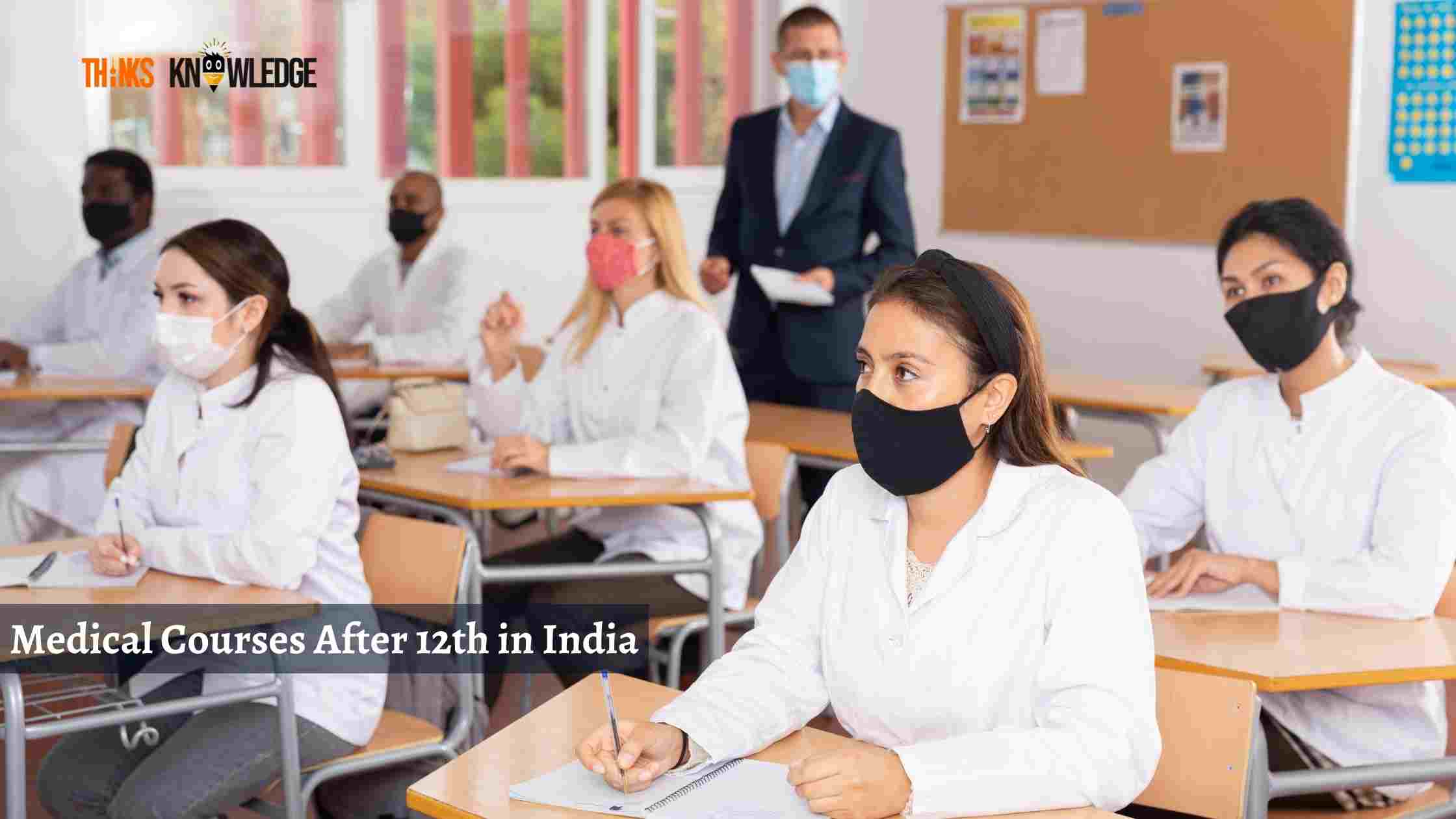Your mind is filled with anxiety as soon as you enter 12th grade. Medical science is a globally thriving industry in this fast-paced world. Medical science is the right career for you if you care about everyone’s health and well-being and are fascinated by human anatomy. To secure a place at the college of your dreams, students from PCB and PCMB (Physics Chemistry Maths Biology) should prepare for NEET. Continue reading to learn more about the top medical schools around the world and the different Medical Courses after 12th available.
Visit us- How to Apply NEET Form Application 2022
Table of Content
Best Medical Courses After 12th
Many students are now choosing to study abroad because of the increased competition at regional colleges. Universities and international courses help to shape professionals, regardless of whether they are high quality or not. Below is a list of the best medical courses after 12th that you should consider after the 12th.

Bachelor of Medicine (MBBS)
MBBS is the collective term for two degrees: Bachelor of Medicine or Bachelor of Surgery. This is the most well-known and accepted medical course after the 12th. It teaches students how to treat individual ailments and what drugs do.
MBBS Syllabus: Subjects
The MBBS syllabus covers a wide range of subjects. It not only provides a foundation in medical knowledge but also teaches you ethical and moral practice. You can then either continue your studies or begin your professional career. Below are the top subjects covered in the most popular Medical Science Courses
- Human Anatomy
- General Medicine
- Orthopedics
- Human Physiology
- Introduction to community medicine and humanities
- Biochemistry
- Radiotherapy
- Ophthalmology
- Psychiatry
- Dermatology
- Pediatrics
- Forensic Medicine, including Toxicology
- Gynecology
- General medicine
- General surgery
- Anesthesiology
- Obstetrics
The MBBS syllabus covers a wide range of subjects. To score well, you need to put in the effort, be dedicated, and get the right guidance. The experts will help you select the right university and assist with the admissions process.
MBBS Admissions Process
The MBBS Admission Process at different universities around the globe is very similar. International students who wish to pursue this course must pass the Foreign Medical Graduate Examination (i.e. The MCI Screening Test. Students must share required documents once they have passed the MCI Screening Test.
- Copy of the 12th Mark Sheet and Transcripts, along with the University’s eligibility documents.
- A duplicate of the passport
After you have submitted all the required documents, the university will initiate the MBBS admission process. The admission letter is sent to the candidate once the scores and documents are verified. The invitation will be sent by the Ministry of Education of your country to help you register for a student visa. It is advisable to start the accommodation arrangements in your country during this phase.
We hope this blog has provided you with all the information necessary to pursue an MBBS degree in another country and also helped you complete the application process at your university. You can find a simplified way to go through the entire MBBS Admission Process.
Bachelor of Pharmacy or BPharm
This four-year undergraduate degree teaches you how to put your professional skills into practice. It builds a solid understanding of biology, physiology, and chemistry. The Bachelor of Pharmacy is designed to provide qualified professionals with basic and advanced knowledge in various areas of medicine such as pharmaceutical care and pharmaceutical analysis. It also includes the production and manufacturing of medical devices, patient-centred pharmacy, and other related fields.
BPharm Eligibility
Below are the basic requirements for pursuing a pharmacy course after 12th grade.
- 10+2 degree, minimum 55% marks
- A subject combination of mathematics, physics, biology, chemistry, and physics
- English proficiency test score in GRE/IELTS/TOEFL
- A clear curriculum vitae
- Recommendation letters, statements of purpose, or any other document
Courses
After class 12, there are two options for courses:
- Bachelor of Pharmacy- B Pharmacist
- Doctorate in Pharmacy-Pharm D
- Diploma in Pharmacy- D Pharmacy
After completing a bachelor’s degree in pharmacy, students can choose to specialize in the field.
- Master’s Degree in Pharmacy
This specialization covers industrial pharmacy, pharmaceutical analysis, and pharmaceutics.
Subjects
Below are the most commonly taught subjects in a pharmacy course.
- Anatomy of the human body
- Human physiology
- Chemistry
- Biochemistry
- Pharmacology
- High-quality assurance
- Drug development
- Drug testing
Bachelor of Dental Surgery (BDS)
The Bachelor of Dental Surgery (BDS), is a program that trains students in advanced knowledge and understanding of dental practice in general. They are trained to diagnose, treat and prevent oral diseases. After MBBS, this 4- to a 5-year program in dentistry is the most popular. Graduates with this bachelor’s degree will be highly sought-after in many industries, including dental product manufacturers, research centers, clinical practice, pharmaceutical companies, and university professors.
Bachelor Of Science in Nursing (BSc nursing)
This course is one of the 3-4 year medical programs after the 12th. It develops compassionate, proactive nurses who can be adaptable, ethical clinicians, and critical thinkers. The program prepares students to handle a variety of medical and health care tasks. BSc in Nursing offers a variety of job opportunities and helps students to get clinical placements in areas like community nursing, nursing for the aged, nursing for the mental health, nursing for the pediatrics, nursing for medical or surgical patients, and so forth.
Criteria for Ph.D. Nursing
It is mandatory that candidates meet certain prerequisites in order to be admitted at the top universities around the world. Doctorate degrees in Nursing can be offered at many universities around the world. However, eligibility criteria can vary from one institution to the next. Candidates are advised to check the official website before applying. We have listed the requirements required for a Ph.D.
- Bachelor’s degree, i.e. BSc Nursing, or in a related field of Medical Science.
- Master’s Degree in Nursing. You can get an MSc/ MPhil/MRes at any reputable medical institution.
- Candidates must have previous experience as a nurse in a healthcare center or other organization.
- Candidates must be able to pass the English language proficiency exams such as TOEFL, IELTS, and PTE with high scores.
- Together with the Statement of Purpose (SOP), a Letter of Recommendation is required.
Bachelor of Speech and Language Pathology
The Bachelor of Speech and Language Pathology is a four-year program that provides students with the skills and knowledge necessary to treat a variety of speech, hearing, and balance disorders. This is a highly respected undergraduate medical program medical courses after 12th that focuses on the practical side of learning.
Eligibility requirements
To meet the worldwide demand for Pathologists, Pathology students will be trained. The courses at universities abroad combine subjective knowledge with practical experience in order to prepare students to take on various jobs. Students must meet the following basic eligibility requirements to enroll in intensive programs abroad:
- High school diploma in Physics, Chemistry, and Biology.
- A four-year undergraduate degree in any subject, with one year each of Physics, General Chemistry, and Organic Chemistry. These are the requirements to take an MCAT (Medical College Admission Test).
- Residency training in Anatomical and Clinical Pathology (AP/CP). There are two options in the USA: AP and CP.
- To apply to top universities, you must have a minimum score of 7. Many universities around the world may require the GMAT or Google.
Bachelor of Veterinary Science
This course lasts between 3 and 5 years and provides students with a broad range of theoretical and practical knowledge that allows them to apply diagnostic and therapeutic methods to all animal types. The Veterinary Courses include Veterinary Biotechnology, Equine Clinic, Animal Production & Reproduction, Biodiversity & Environmental, and Animal Production & Reproduction. In addition, the last years of the program will be spent in the clinical apprenticeship, where you will gain exceptional knowledge in Medicine, Radiology, Surgery and Anesthesia.
Different types of veterinarians
It is easy to answer the question “How do I become a veterinary physician?” by knowing that you have the option of choosing from any of these specialized areas of Veterinary Science.
- Companion Animal Veterinarians can be found in private hospitals. They provide care for pets such as cats, dogs, and birds.
- Food Animal Veterinarians treat injuries and illnesses in farm animals such as cattle, sheep, and goats. They also educate farm owners about proper animal care and health.
- Food Safety and Inspection Veterinarians are responsible for researching and developing preventative measures to avoid the transmission of diseases between animals and humans.
- Equine Veterinarians assist in the medical treatment and care of horses.
- Research Veterinarians participate in research to discover new surgical techniques and diagnoses.
Essential Skills- The right education and training can help you become a veterinarian if you have an interest in animals and wish to make it a career. The different aspects of animal care require vets to be able to handle restraints, medications, surgeries, medical conditions and vaccines. This requires patience and dedication to assist animals and pets as well as their owners.
Are you interested in how to become an aspiring veterinary doctor? These are the 5 fundamental characteristics that veterinarians must possess in order to be able to practice veterinary medicine.
- Excellent communication skills and a positive attitude are key to facilitating helpful interactions between pet owners and their pets.
- A genuine and empathic approach to pet owners in order to provide support and reassurance.
- Effective time management and organizational personality are essential to ensure that hospitals and clinics run smoothly.
- Technical ability to use technical machinery and laboratory equipment for diagnosing and accurately treating sick and injured animals.
- Passion for animal welfare and well-being
We hope you found this blog helpful in locating information about various medical courses after 12th. You are considering studying medicine after high school but don’t know where to begin.





